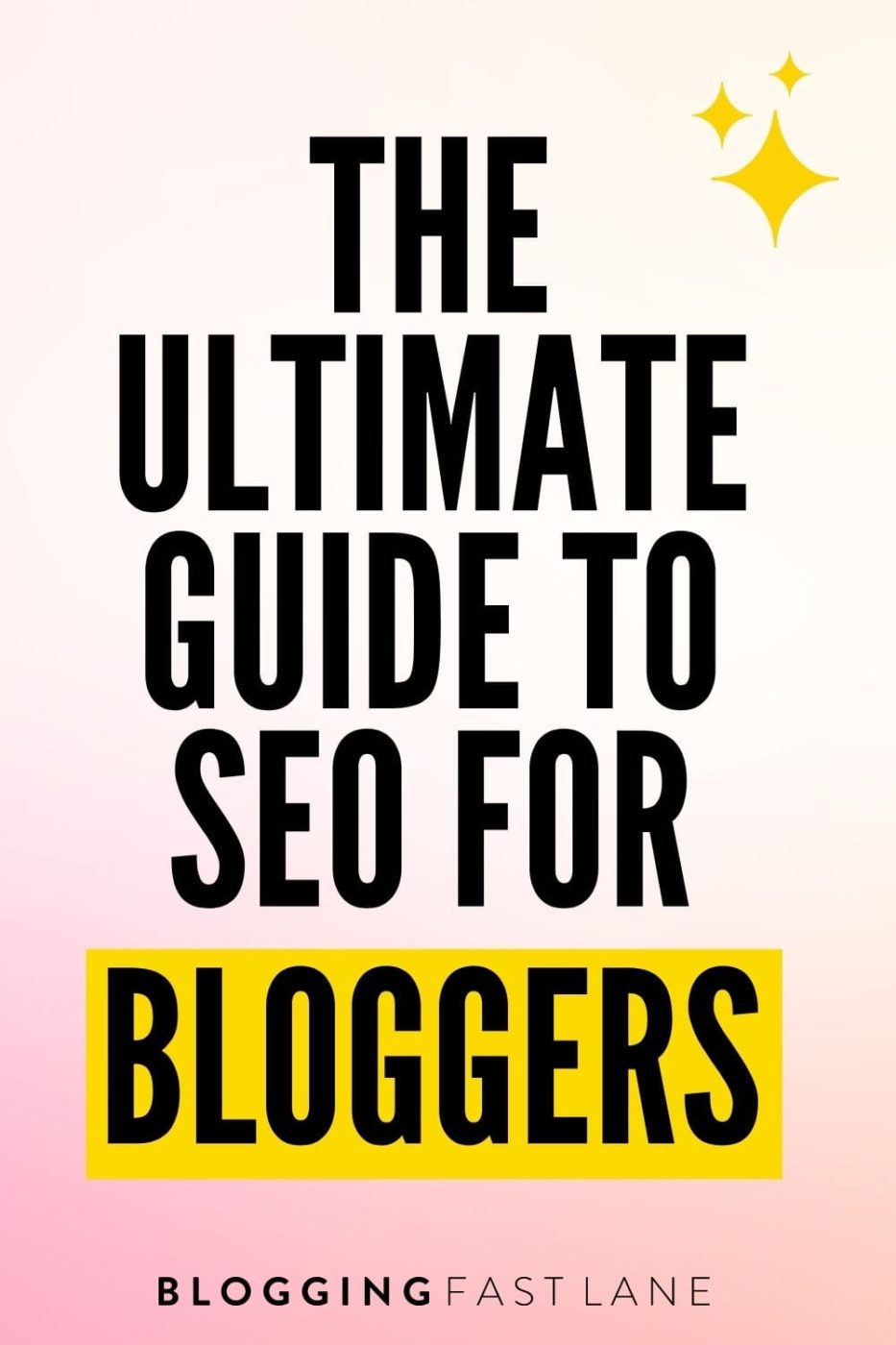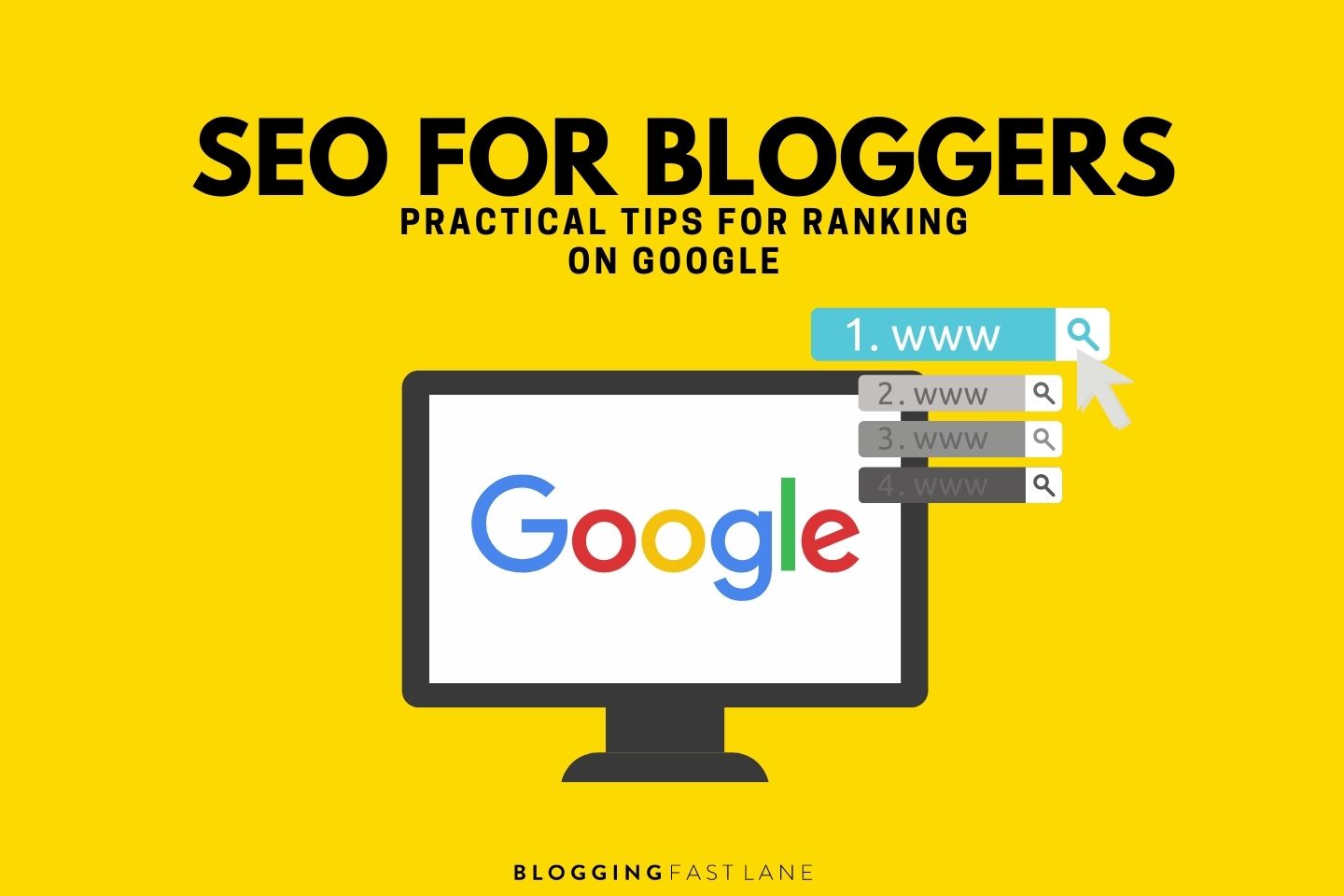
This article may contain affiliate / compensated links. For full information, please see our disclaimer here.
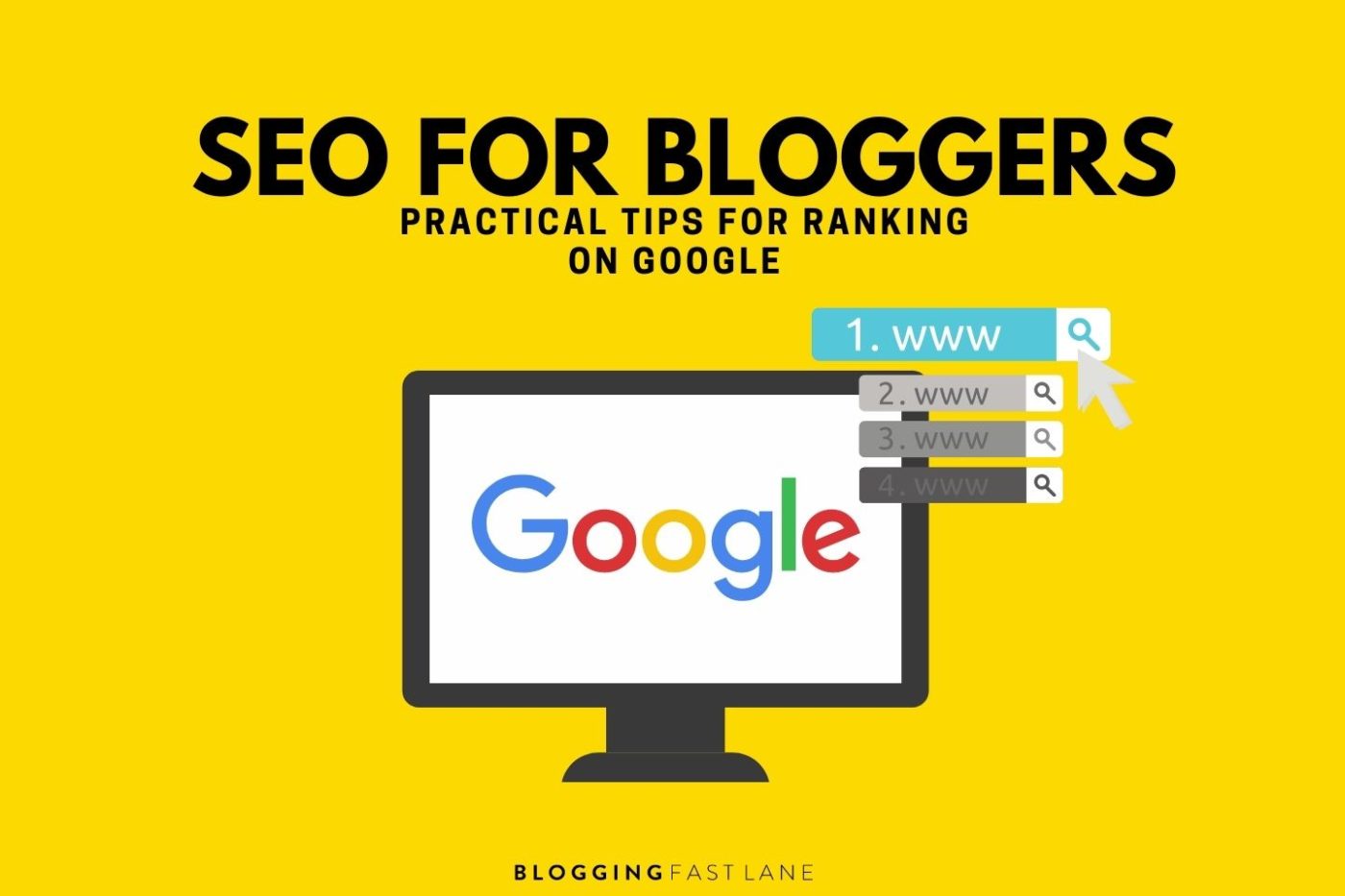
If you want to learn all about SEO for bloggers, you’re in the right place.
In this article, I walk you through all of the SEO basics including why it is crucial for your blog and a few strategies and tools that you can implement straightaway.
Although it may sound complicated at the beginning, by the end of this article, you should have a full understanding of how you can shape your blog to perform well on search engines. Even just learning the basics will have an immense impact on your traffic and how your blog performs on Google.
SEO completely transformed our website from a simple blog into a full-blown business. It’s helped us reach new heights that we never thought were possible!
It may be a little tricky, but learning SEO was by far one of the best ways we expanded our travel blog, Adventure in You, which received nearly 6 million page views in 2019.
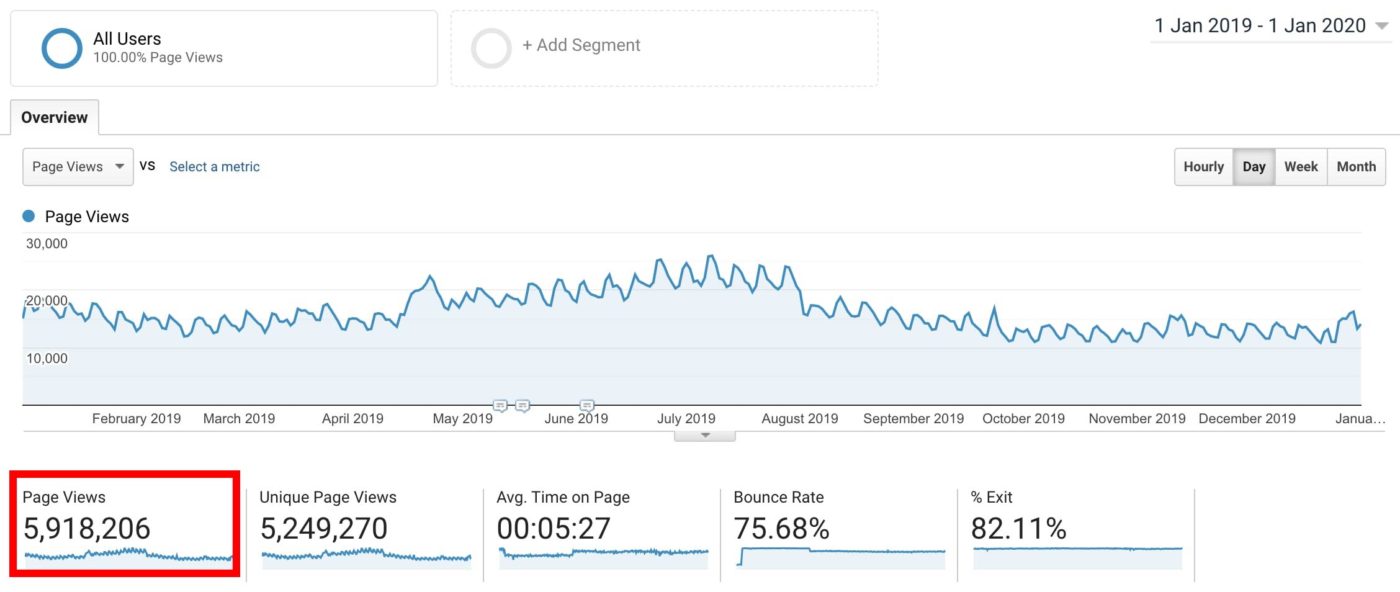
Ready to get started? Deep breath, you’ve got this.
What is SEO?
Before we get into the nitty gritty of things, let’s break down SEO into super simple terms.
SEO, or search engine optimization, is the process of improving a website’s visibility in search engine page results. Doing this increases the quality and quality of traffic through organic search queries (Moz).
Essentially, at the most basic level, SEO is how to appear on the top pages of Google when someone searches for something online.

Why SEO is Important
SEO is so important when it comes to blogging. It’s an essential skill for bloggers to develop if you’d like to be successful in the online world and make some money from your blog.
You see, when you have a blog that’s super optimized for SEO, your articles will start to rank on the SERPs (search engine pages). For example, when someone searches with the keywords “campervan conversion New Zealand”, your article is one of the first to pop up (so long as your SEO is on-point), driving you a steady amount of organic traffic.
If your campervan article is one of the first results, people are more likely to click it before going on to results on the second or third page of Google. In fact, less than 1% of people searching for something on Google make it past the first page, making it extra important to get your articles in those competitive positions.
Organic search traffic is the best way to build up your blog and get consistent traffic over the long term. There are more than 3.5 billion searches on Google every single day, making it the single best place to rope in new readers over and over again.
As there will always be an immense number of people looking for something on Google, having strong SEO for your blog increases your chances of getting in front of those billions of eyes consistently for years to come.
So why does this matter? Well, ultimately when your blog gets more traffic, you’re able to earn more income. More people on your blog means more eyes on your affiliate links, advertisements and products. With more traffic, there’s an increased chance of someone actually making a purchase.
Awesome SEO impacts more than just your rankings and traffic… it is directly tied to your income, making it one of the most crucial components of building a business out of your blog.
Understanding How Google Works
To become an SEO ninja, first you’ll have to have a pretty good understanding of how Google works. No, you don’t need to know all the technicalities behind the world’s largest search engine, but it really helps to have a handle on the way Google works and operates to use this to your advantage.
Before running through how exactly Google works, it’s worth noting that no one is really sitting at Google headquarters reading every single article online.
Rather, a machine crawls content for keywords and assigns a ranking based on different components that make up a high quality article.

Some of these components are directly related to the writing of an article, like article length, targeted keyword, and headlines, but other components may be images, backlinks, URL structure, and more.
Understanding each of these unique components and optimizing them so they’re the best they can possibly be is the fundamentals behind SEO for bloggers. If you can understand how Google really works, you’ll be on the fast track to blog SEO success.
Search Intent
The first thing that you need to understand with Google is search intent. Keep in mind that Google’s main purpose is to show people relevant results for their search queries.
This means that what Google displays as search results need to match people’s user intent.
So if someone is searching for cookies, it makes most sense in Google’s eyes to show them articles that most closely match this search query, but also that fulfill the user’s search intent.
Why might someone be searching for cookies online? Overall, the most common answer is probably for a recipe to make cookies. But maybe they’re looking for different types of cookies or where to buy cookies.
Since most searches online are pretty general, it’s up to Google to choose articles that are most likely to satisfy the overall user intent.
Let’s take a look at Google to see what it thinks about cookies:
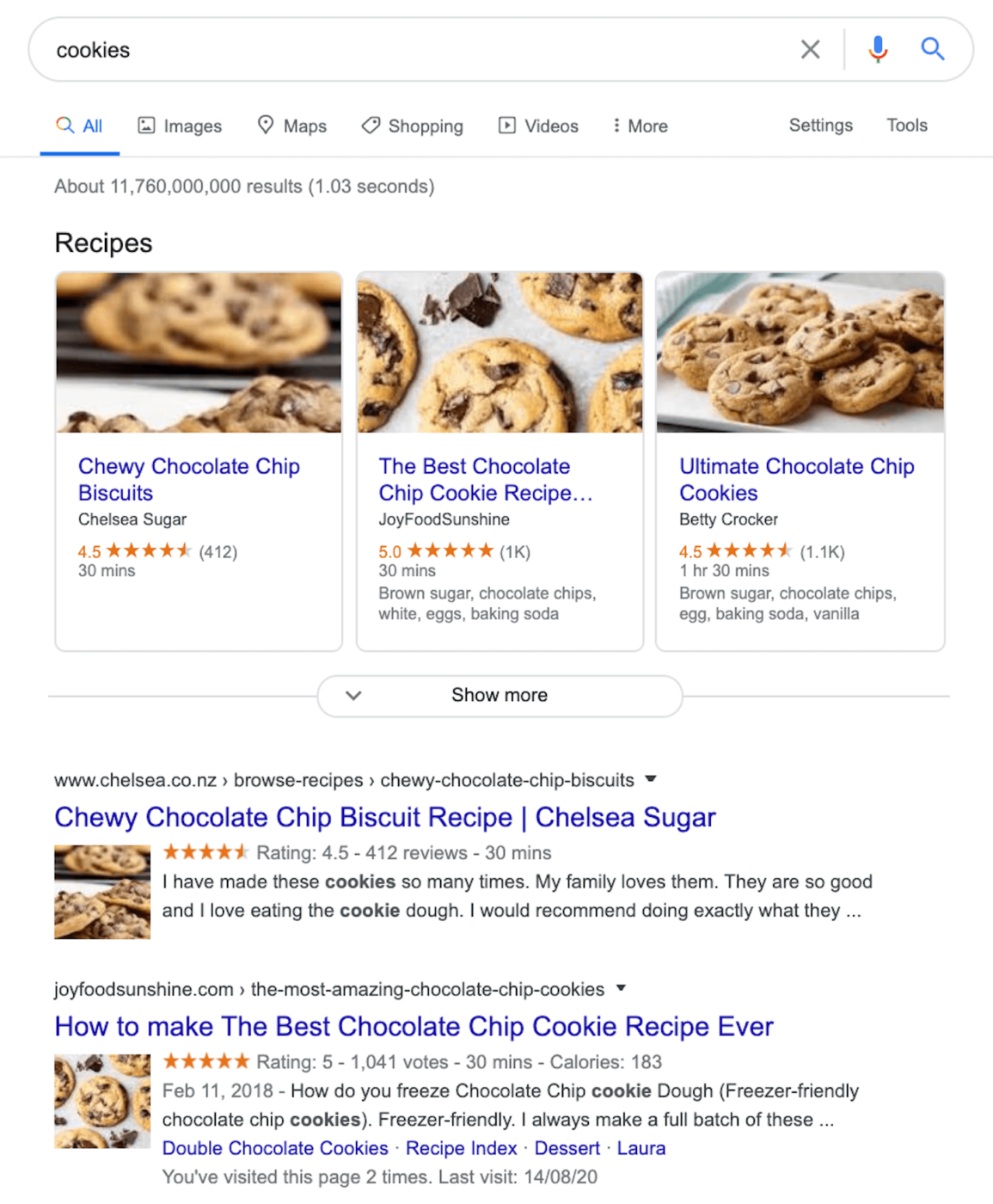
Out of all of the information about cookies online, what Google pulls up when you search for cookies are recipes! Which means that the overall search intent behind searching for cookies online is to learn how to make them.
Google gets this information from crawling all across the web to see the most sought-after answers when someone uses “cookies” as a particular search term.
Understanding how Google satisfies a user’s search intent is a great way to get your foot in the door with SEO. If you can write articles about certain topics that satisfy user intent, you have a much better chance of ranking for the main keyword on Google.
When trying to rank for a particular keyword, examine all the blogs that are ranking on Page 1. Identify what keywords they are using, take a look at their article structure, and use this information to help you create a better article that is SEO-optimized.
Authority and Relevancy
Google also tends to “play favorites”. When it comes to search engine results, Google is much more inclined to rank websites that show authority rather than the new guy on the block. Since certain websites may appear to be “experts” on individual topics, Google is much more likely to rank their articles first for relevant keywords.
Why is this?
Well, Google wants to satisfy user intent to the fullest extent and one way to do this is by providing information from those who know the most about it. When a website shows authority, in Google’s eyes, it has the most credible information.
This is why certain websites like the New York Times or Buzzfeed or the Food Network may be the first result in many searches. Their high level of authority pushes them to the top of the search results.
Later on in this article, I also walk you through how to build your blog’s authority through backlinks, which is another crucial aspect of SEO.
Bloggers can do this by building authority around important topics in their niche. By consistently writing detailed articles around these topics (utilizing SEO strategies), Google will begin to pick up on them and see you as having authority on the certain topic.
In our blogging course, Blogging Fast Lane, we teach our students all about how to build authority using Authority Pillars. The general concept is that these pillars are long, in-depth articles about a certain topic, with tons of sub-articles that fall under them.
For example, on our travel blog Adventure in You, we have a pillar article on Spain which covers all the details a traveler needs to know about Spain. It includes dozens of sub-articles about things to do in different cities in Spain, the best Spanish food, Spanish festivals, etc…
What this does is show Google that we know a thing or two about Spain since we have all of these articles surrounding one central topic. This can lead to Google ranking our Spain content higher as there’s lots of evidence to support our knowledge on the topic.
Authority pillars should be directly related to your niche and can work for any kind of blog!
This is an example of what it looks like all laid out:
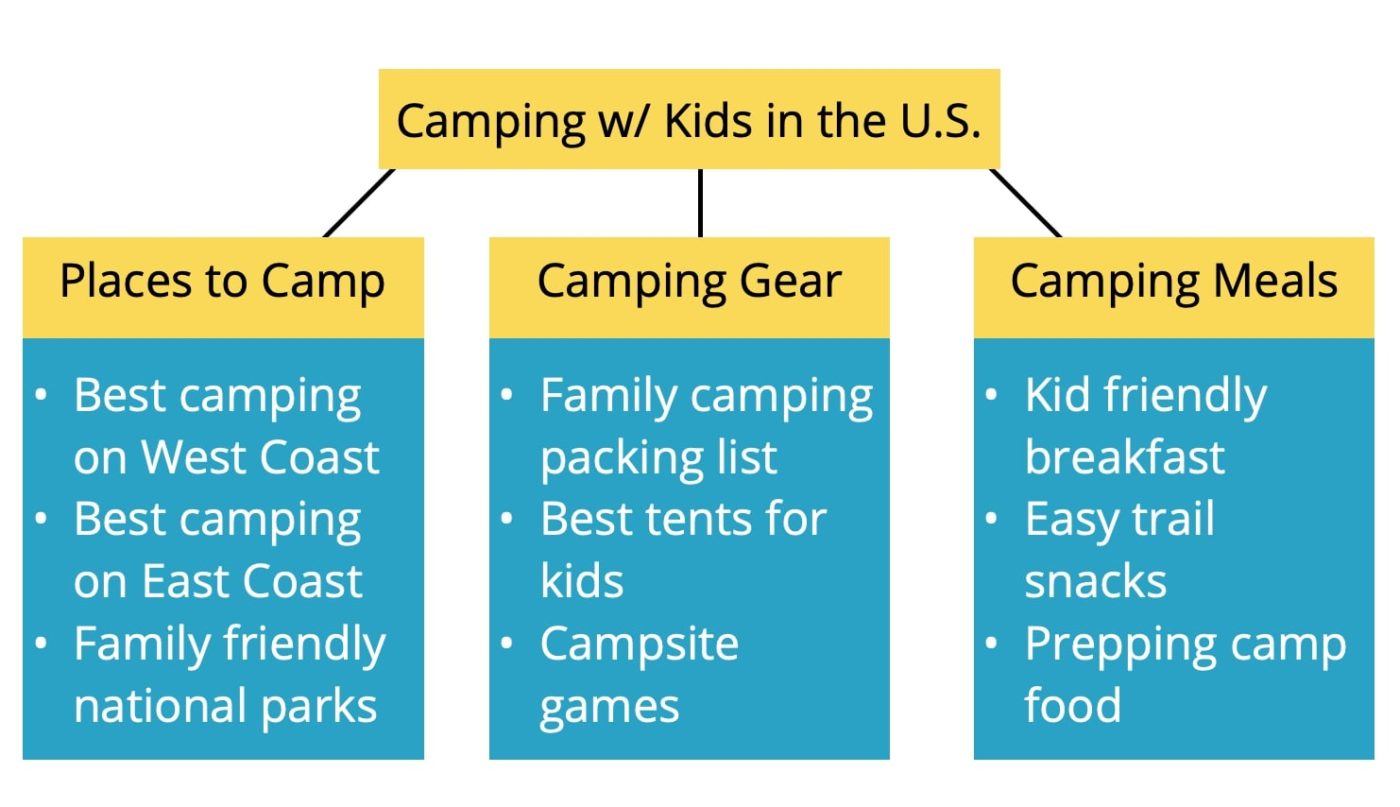
The main niche is camping with kids in the U.S., and beneath it are three different authority pillar examples, with some corresponding sub-articles.
Structuring your content this way is one of the top ways to build authority in the eyes of Google as everything is interconnected and ties back to the central blog topic!
You can learn more about our Authority Pillar strategy and how it took our blog to the next level in our free online training.
But authority isn’t all that matters when it comes to ranking on Google. In fact, relevancy matters just as much, if not more.
If you go to Google yourself and type in “cookies”, what are the websites that show up?
From completing the search myself, I can tell you that almost every single one of them is a recipe or food site. There aren’t outdoor blogs or travel websites or crafting content coming up. Instead, everything that’s displayed comes from a very clearly relevant source.
So what does this tell us? Google really favors content if it’s from a relevant website.
If you want to write about cookies, your article will perform best if it comes from a food blog. This rings true for just about every topic!
- You’re more likely to rank for an article about backpacking Thailand if you have a travel blog.
- You’re more likely to rank for a camping packing list if you have an outdoors blog.
- You’re more likely to rank for a home renovation project if you have a DIY blog.
Writing content that is extremely relevant to your niche is one of the top ways to perform well on Google.
High-Quality Content
Finally, the last big key to the huge Google puzzle is high-quality content. Since Google’s main goal is to provide relevant content that satisfies user intent, it’s much more likely to rank longer, in-depth articles rather than quick little snippets that may keep the reader wondering.
To rank on Google, you should write content that’s a one-stop shop for readers. After checking out your article, they shouldn’t have to go anywhere else to find answers, since you’ve given all the pertinent information in your content.
You should also write blog posts that people will keep reading.
Try to provide value in your content and really dive deep into reader’s questions. Show a true understanding of a topic and write bigger and better than everyone else who’s written on the same subject.
If you can do this, Google (and readers) will see the value in your content and rank you higher.
I get that this can be pretty subjective but look at it from this angle:
Google has the choice to rank 2 articles on tents. One article offers 10 choices with long in-depth reviews, going over the pros and cons of each choice and covering things to look for in tents, as well. The other article has 2 choices with a few sentences under each.
Which article do you think is going to rank better?
If you guessed the first article, you’d be right. Google really favors content that’s long, detailed, and in-depth rather than quick bits of text.
Keep the notion of high-quality content in mind when you write articles for your blog. The more you can do this, the easier it will be to get on Google’s good side.
Pro Tip: Start with a blog post outline before you begin writing. This will help to structure your ideas and create an article that flows well!

Our #1 Tip For Blog SEO: Do Keyword Research
When it comes to SEO for bloggers, there is nothing, I repeat, nothing more valuable than keyword research.
What is Keyword Research?
Keyword research is the process of using an online tool to look for keywords that people use as search terms online.
This gives you some insight as to what people are looking for and the exact words that they use.
Keyword research tools offer an idea of the volume of a certain keyword (how many people are searching for this term) along with keyword difficulty, or how hard it is to rank for a keyword.
You can also find tons of related keywords during the keyword research process, which can help you structure your article in a way that is keyword and SEO-friendly in Google’s eyes.
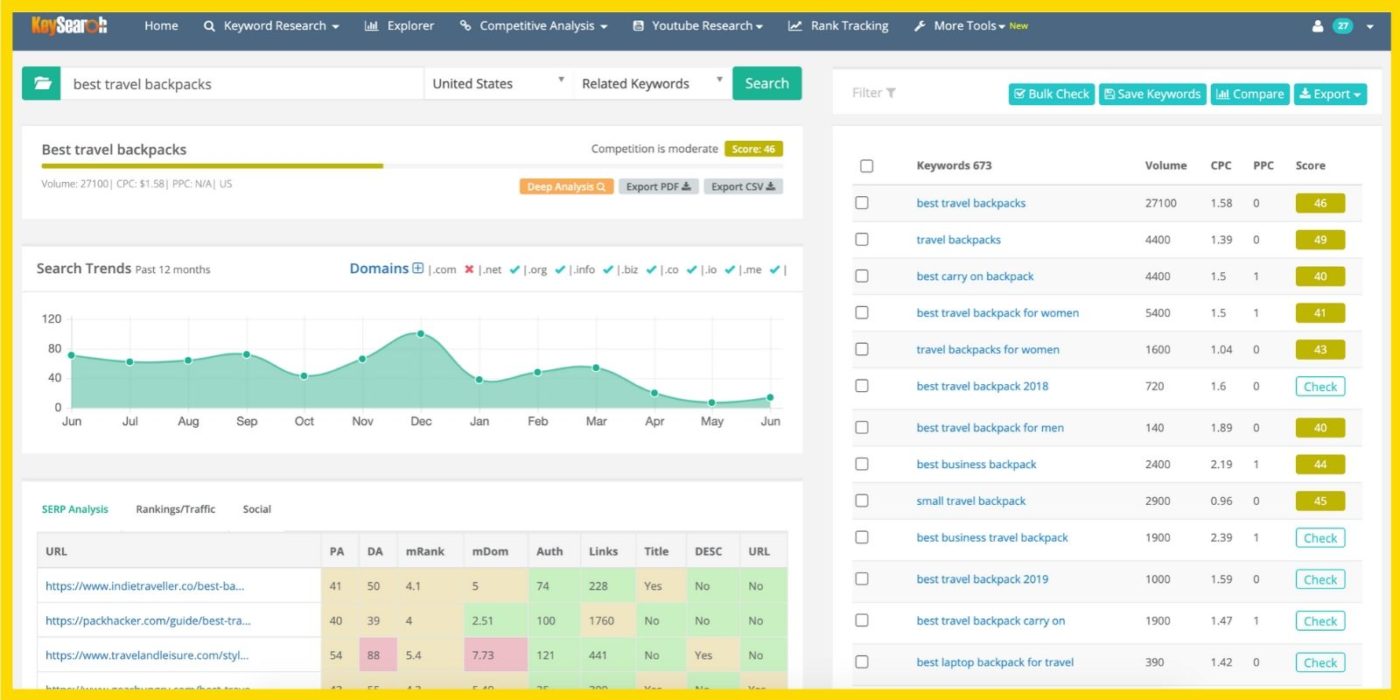
Why is Keyword Research Important?
Knowing, understanding, and doing your keyword research is one of the most effective ways to get articles ranking as you can exactly target what people are looking for and build content around it.
When you incorporate specific keywords into your content, it also helps to show Google what your article is about, which leads to better rankings on search engine results.
In fact, doing keyword research was a huge turning point for our blog.
Before understanding how important this was, I would write about whatever I felt like. Anything travel-related that popped into my head I’d create an article about it. However, after being shared on social media a few times, these articles no longer got any page views because people weren’t actually searching for those keywords.
But when I started to write articles based on my keyword research findings, that incorporated specific keywords into the text, our traffic skyrocketed.
Not only was I writing articles that people actually wanted to read, but I could write less and get more traffic than ever before.
Check it out:
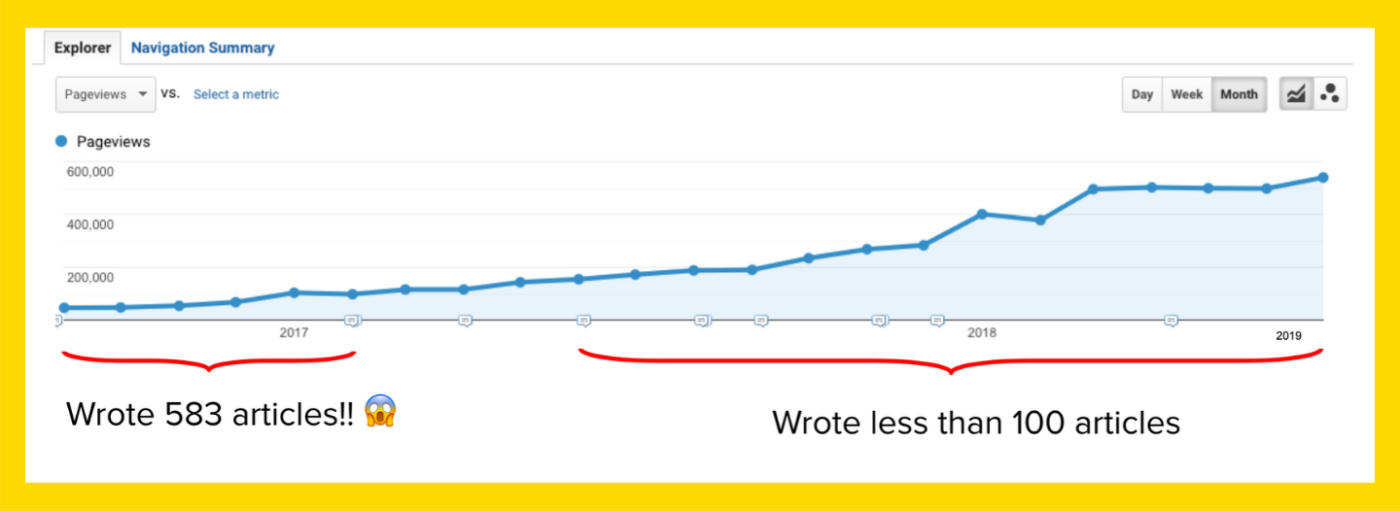
Through targeting specific keywords I found doing keyword research, I was able to start producing content surrounding what people were actually interested in, rather than what I thought would make a good article.
As you can see, our traffic increased greatly while the number of articles I published decreased.
Keyword research should be central to any blogger’s content strategy as it really is the best way to write relevant content that people will actually want to read.
Okay, now that you have the basic overview, let’s get into some of the more technical aspects of SEO.
Types of SEO
Now let’s talk basics of SEO.
SEO typically falls into 2 categories: on-page SEO and off-page SEO.
In this section, I cover everything you need to know about on-page SEO for your blog and how you can get this process rolling right away.
What is On-Page SEO?
On-page SEO refers to the actions you can take on your own blog to improve SEO.
On-page SEO is made up of a lot of moving pieces, but its main purpose is to make it as easy as possible for Google to understand what specific blog pages, articles, and posts are about.

Write Valuable Content
When it comes to creating content that’s super optimized for SEO, the best thing you can do is create something that’s bigger and better than what already exists online.
I touched on this earlier in the “Authority” section, but it’s worth mentioning again.
When you can write an article that’s more detailed and in-depth than anything else online, not only do you satisfy user intent but you also have more chances than anyone else to incorporate relevant keywords and optimize your content so that Google can get a clear read on it.
If Google has a choice between a 5,000-word article that’s well-organized, researched, and full of captivating images, it’s more likely to rank it higher than a 500-word article with blurry graphics on the same topic.
Keep this in mind when you write articles for your blog. While it may seem appealing to breeze through content writing and publish tons of articles, the quality of them matters more than you would think in terms of SEO.
Include Your Keyword in the Blog Post
When creating content for your blog, one of the top ways to increase your on-page SEO is by including keywords in your article.
Once you do your keyword research for a specific topic, make a note of some keywords with a high volume and low difficulty. Then, try to integrate these words naturally into your text.
The more naturally-included keywords, the better. This will clearly show the Google bot crawling your page that your article is about a specific topic.
For the best on-page SEO for bloggers, get in the habit of including your keyword:
- In main title and headings
- In the first 100 words or first paragraph, if possible
- Sprinkled naturally within the body of your text throughout
Be consistent, but more importantly, be natural with your keyword use. The more you can include, the easier time Google will have understanding what your blog post is about.
Use LSI Keywords In Your Article
Besides just including the main keyword in your content, having related keywords, or LSI words, greatly contributes to on-page SEO as well.
LSI stands for “latent semantic indexing”, and are basically related keywords that help round out content. While Google crawls for the main keywords, it also looks for LSI words to get a full picture of your content and understand what it’s about.
For example, if your main keyword is “campervans in New Zealand”, some LSI words might include “rental”, “hire”, “road trip”, “reviews”, “for sale”, “price” etc…
You can find LSI words using tools like Uber Suggest or LSI Graph, but my personal favorite method is just going to Google and using the autocomplete function in the search bar.
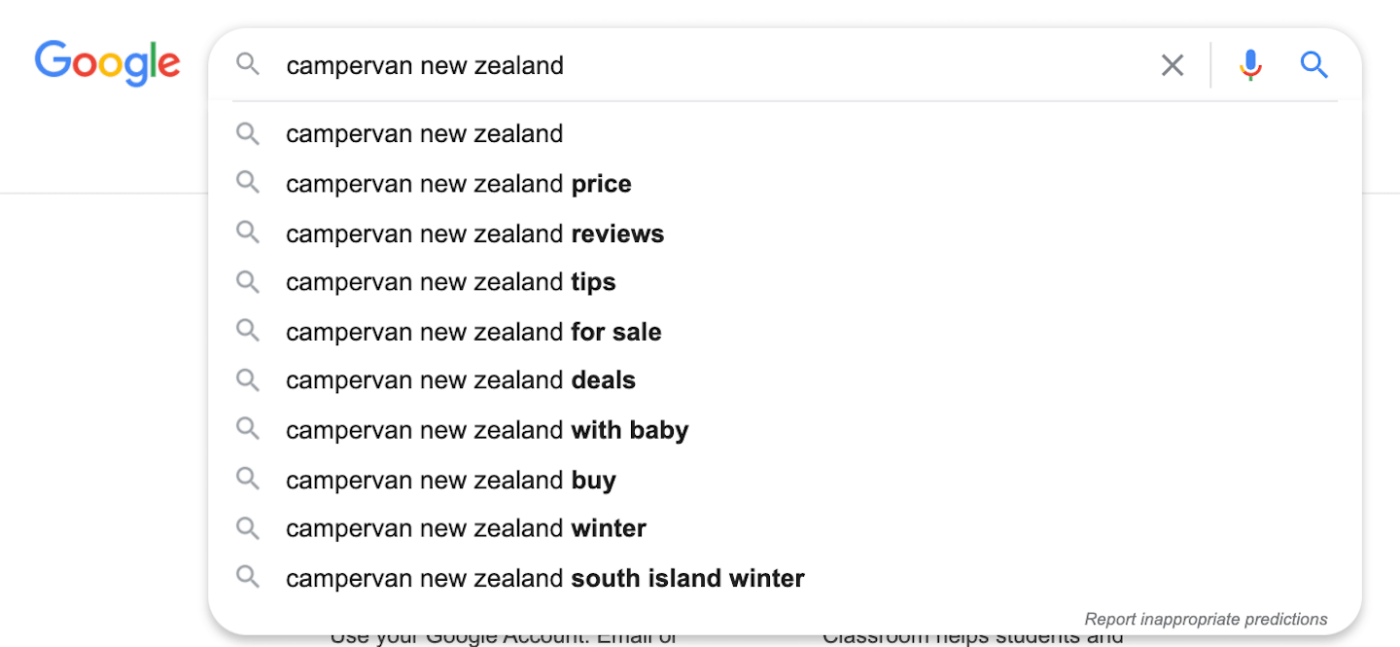
Keep the URL Slug Short
To make your content easy to understand right from the get-go, it’s best for on-page SEO to come up with a short URL or slug. This is the little section of text that comes after your blog name in a URL for a specific article.
For example, the slug for this post is “SEO-for-bloggers”.
From a glance, readers are able to know exactly what this article is about and so will Google.
To make your slug most effective, it’s best to include your main keyword within it and get rid of any stop words so it’s straight to the point.
Incorporate Internal Links
A large part of SEO for bloggers is interlinking your content. You can do this by creating spots in your post to link out to your other related content.
For example, in our Authority Pillar article about Spain, we’re able to link out to articles like:
- Things to Do in Barcelona
- What to Eat in Spain
- Where to Stay in Madrid
- Best Markets in Spain
- Top Spanish Festivals
- … and more!
Then, from each of these articles, we’re able to link out to even more.
From “Things to Do in Barcelona”, we can link to articles like “Where to Stay in Barcelona” and “Best Restaurants in Barcelona”, then back to the pillar article. From “Top Spanish Festivals”, we can link out to articles about the destinations the festivals are held in.
Interlinking is useful for a few reasons:
- Allows users to move around your blog. If they finish one article and there’s another one linked, it creates a natural segway to keep them on your website.
- Creates an information hierarchy on a blog. The Authority Pillar is at the top of the food chain, with all of the sub-posts pointing back at it. This shows a clear hierarchy to Google.
- Helps spread link equity and ranking power. Interlinking passes on link juice to other articles to help get more posts ranking.
Overall, interlinking creates a kind of roadmap of your blog for Google, showing where the most important posts lie, with the supporting articles clearly defined.
Link to Other Authoritative Sites
Besides just linking to yourself, it helps with on-page SEO to link to other authoritative sites.
What this does is shows that you’ve done your research and your article is backed up by relevant and reliable sources. This shows Google that your article is also relevant and reliable, giving it a higher chance of ranking.
Write an Engaging Meta Description
Finally, an element of blog SEO that’s often forgotten is the meta description. This is the little snippet of text that Google displays on search engine results with your article.
If there’s no meta description, Google tries to pull a relevant chunk of text to use for it from your article.
However, as bloggers, we can use a meta description to our advantage by writing it ourselves and incorporating important keywords, which you can do using the free Yoast SEO plugin.
This shows Google what the purpose of a specific article is, and also shows readers that your post is what they’re looking for.
Meta descriptions must be short and to the point while still being engaging enough to get people to click on them. The more engaging, the better because oftentimes the deciding factor of what article gets clicked on or not is the meta description.
So catch some eyes and use this piece of SEO to drive readers to your blog!
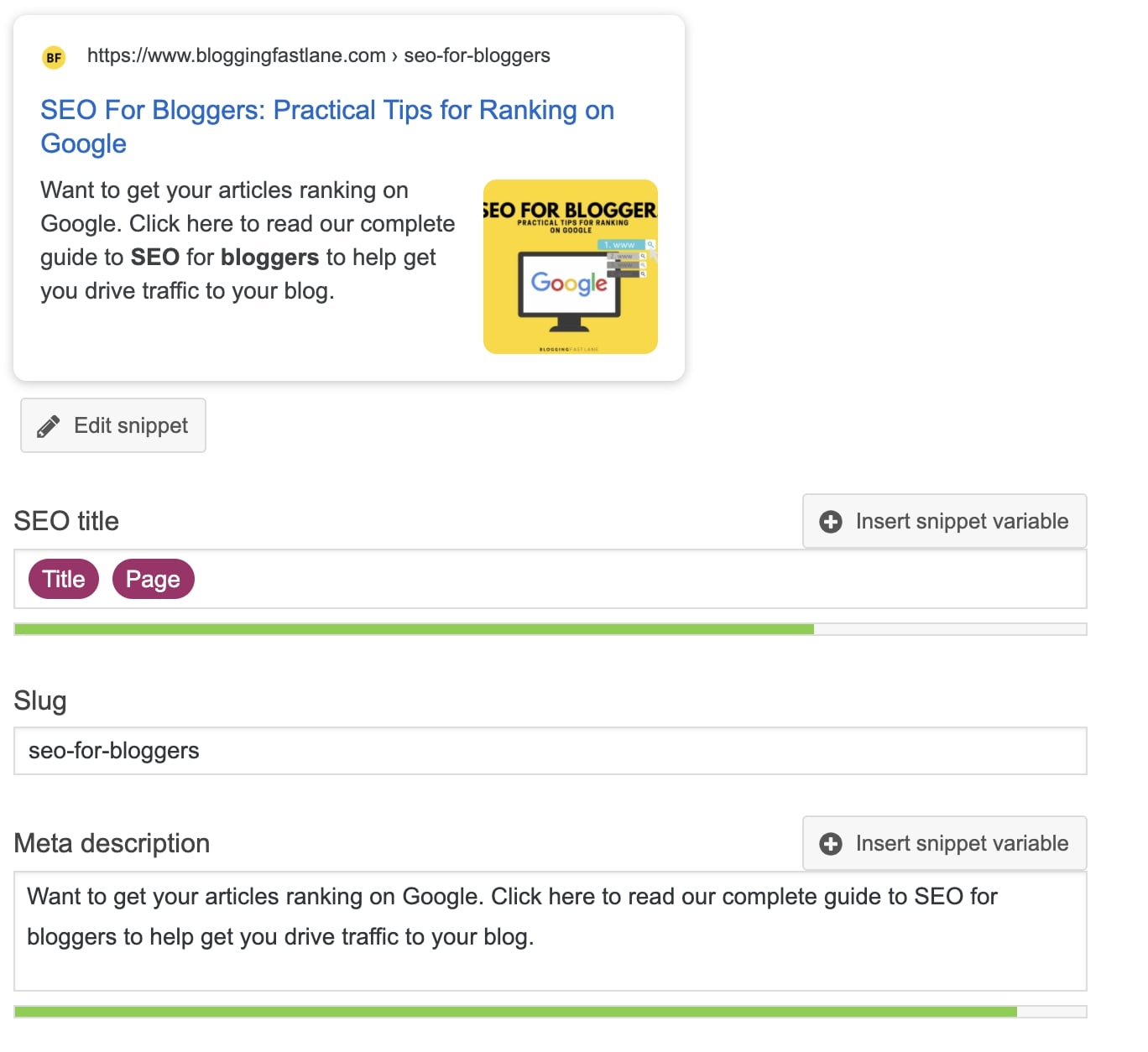
Off-Site SEO
Besides on-page SEO, there is also off-page SEO which is another form of optimization to improve your search engine page result rankings for your blog.
What is Off-Page SEO?
Off-page SEO are all the things that you can do outside of your own blog to impact your rankings. Off-page SEO is generally less in-depth than on-page but is still extremely important for giving Google a well-rounded picture of your blog.
Build Backlinks to Your Blog
The biggest way to beef up your off-page SEO is by building backlinks to your blog.
What are Backlinks & Why are They Important?
Backlinks are when another website or blogger places a link in their content pointing to your blog. Backlinks are “do-follow” links with the intention of sharing some link juice from their page with your article.
Backlinks are important as they’re a top way to build authority to your blog.
If there are tons of other websites pointing at your article about how to tie dye, this shows Google that you must know what you’re talking about on this subject, which results in… you guessed it: higher rankings.
When people link to your blog, this serves as a “vote of confidence”, sending signals to Google that your blog is trustworthy.

Ways to Build Backlinks
There are a few different ways to build backlinks, and through a combination of all of them, you’ll be able to build a solid portfolio for your blog and show Google that you deserve a spot in one of the top search engine results.
1. Guest Posts
A very effective way to gain backlinks for your blogs is by writing guest posts! Guest posts are where you write an article that’s published on someone else’s blog. The benefit of this is in exchange, you receive links back to your blog.
Not only do you build backlinks this way, but you also gain referral traffic from an audience who may not have found your blog otherwise.
If you’re curious about how to go about guest posting, click here to see our complete guide.
2. Press & Media Features
Another way to get backlinks is to have press or media features about your blog. It’ll be next to impossible to get the New York Times or Washington Post to feature your blog, but you’d be surprised at what local news outlets are willing to cover.
When we first started making money with Adventure in You and transitioned to it being our full-time jobs, my partner Tom reached out to tons of local media outlets around where he grew up in the U.K.
While most people ignored him, there were a few that agreed to do features on us and our blog.
This got us powerful backlinks as news and media websites typically have high domain authorities, which means backlinks from them are extremely valuable.
When you have powerful backlinks pointing to your blog, it weighs on Google heavily. It shows that if people with authority trust you, then your article must be worth ranking.
Last year we were featured in Foundr, an online publication about entrepreneurship. This helped build our authority even further as the interview covered our blogging feats and provided us with a valuable backlink.

3. Collaboration Posts
One last way to get backlinks to beef up your blog SEO is by participating in collaboration posts.
This is generally where a blogger reaches out to other bloggers to come together to work on one post. Typically, collaboration posts are made up of lots of little snippets from other bloggers, who all receive a link back to their blog.
For example, a collaboration post might be on the topic of best weekend getaways in the U.S., and lots of bloggers write 100-200 words on their favorite destination.
While the link juice is spread pretty thin in these kinds of posts (lots of links going out), they’re still worth it for beginner bloggers looking for ways to get backlinks.
You can find lots of Facebook groups full of people looking for help with collaboration posts.

How to Track Your Blog’s SEO Growth
As your blog begins to grow and all of your SEO work starts to pay off, you’ll want a way to track your accomplishments and see how SEO has helped your blog.
Use a Keyword Tracking Tool
The best way to track your blog’s SEO growth is by using a keyword tracking tool. What these tools do is they allow bloggers to input a specific keyword with the URL of their article. Then, the tool tracks the keyword to show the ranking for that article.
This is really useful because it not only shows current rankings, but the change over time as well. You can really see where your SEO has started to work when there’s an awesome ranking score and a spike in traffic.
The specific tool we use for this is SerpFox, which gives us a monthly report on our ranking articles based on keywords we’ve set it up to track.
Keysearch, which I will share about in a bit, also has a rank tracking tool that comes with the Basic plan. This allows you to track a number of articles in the same place as you do your keyword research, without having to add on an additional tool.
Our Recommended SEO Tools for Bloggers
I know that SEO can be so overwhelming sometimes for bloggers. But if you have the right tools, it makes this process a million times easier, trust me.
Here are some of the top SEO tools that we use that we truly couldn’t live without.
Keysearch
My top tip for being successful in SEO as a blogger is to invest in a keyword research tool. There are tons of them online, but our go-to is Keysearch.
Not only is it super affordable and user-friendly, Keysearch is ideal for bloggers and small businesses interested in growing their organic traffic. We personally use Keysearch and couldn’t be happier with its functionality.
For $17 per month, you’ll get tons of functions like unlimited keyword searches, competitor analysis, backlink reports, and rankings and beyond. This is really reasonable considering some keyword research tools cost more than $90 a month!
Plus, readers of Blogging Fast Lane can take a discount on this price and secure Keysearch for just $14 per month!
For the full scoop on Keysearch, check out our in-depth review here.
Keysearch is a super affordable tool that has both yearly AND monthly plans. If you would like to try the tool, use the coupon code “FASTLANE” for a discount!
If you’re serious about learning SEO and increasing your blog’s traffic (and income), don’t skimp when it comes to a keyword research tool. It’s an investment that will pay itself off, time and time again.
Yoast SEO Plugin
Another tool that’s really upped our SEO game is Yoast, a WordPress plugin to use with your blog.
Once Yoast is connected to your WordPress, it gives recommendations for how to improve your on-page SEO throughout your content. It also allows you to edit your URL slug and craft your own meta descriptions instead of letting Google do it for you.
There’s a free version of this plugin, but to make the most of Yoast and really improve your SEO, it’s 100% worth upgrading to premium for $69.
Google Search Console
And to tap into SEO right from the source, Google Search Console is an amazing (and free!) tool for bloggers to monitor where they stand in Google’s search results.
While Google Analytics has to do with how people interact with your website, Google Search Console was created especially for understanding the search engine and giving users tools to help improve their visibility rankings.
I know that this may be a ton of information to take in, but remember, these are only the basics!
However, if you can learn the basics of SEO as a blogger and really apply these strategies and tools to your website, you’ll see an immense improvement in your blog’s rankings, traffic, and income.
Remember, SEO is connected to everything.
If you want your articles to show up first in search engine results, SEO can help you there. If you want more traffic to certain articles, use SEO to drive it. Want to earn a serious income with your blog and turn it into a full-time business? SEO is central to making this happen.
Make it your mission as a blogger to learn as much as you can about SEO and you’ll benefit from it every day that your blog is online.
Like this Article? Pin it!

